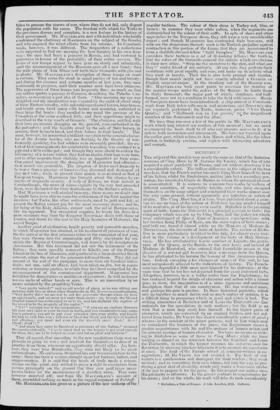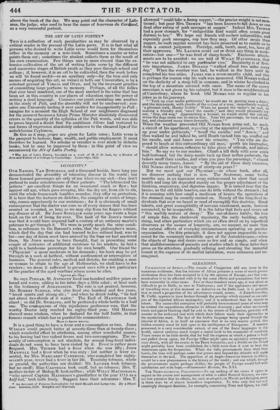RICHELIEU.*
THE subject of this novel is very nearly the same as that of the historica romance of Cing Mars, by M. ALFRED DE VIGNY, which has of late acquired a great popularity in France, and not without deserving it to a considerable extent. Tire trifling difference in the subject of the two novels is, that the French author has made Chic.' Mars himself the hero of his fiction, whilst the Englishman, making him but a secondary per- sonage, has invented a Comte de Blenau in whom the principal interest is concentrated. It is curious to compare two works by writers of different countries, of respectable talents, and who have occupied themselves on the same subject and conducted their works almost over the very same ground, without apparently any imitation or notion of rivalry. The Ging Nuns has, it is true, been published about a year; but we see no trace of the author of It ieltelieu having availed himself - of its contents, or of his having even read it. Richelieu is the presiding spirit of both : Lotus the Thirteenth is a principal portrait in both : the conspiracy which was got up by Chu' Mars, and the jealousies which were entertained of Queen Anne of Austria's correspondence with her brother King Philip of Spain, are the main topics of both storitet and both are founded almost solely on the Memoirs of Madame de MOTTEVILLE, the favourite of Anne of Austria. The author of Riche- lieu is more particularly indebted to this lady, for almost every inci- dent in the volume is a development of the hints of Mad. MOTTE- VILE. He has attributed the heroic conduct of Laporte, the .gentle- man of the Queen, in the Bastile, to his own hero; and instead of Madame de Hauteford, who entered that formidable prison in the disguise of a servant girl to convey him a message from the Queen, he has attributed to his heroine the honour of this dangerous adven- hire. Indeed, excepting a few changes of names of this sort, he has most scrupulously adhered to the indications of history. The French- man has depended a little more upon himself for his materials ; at the same time that he too has not departed from the great historical facts. Altogether, however, he is a bolder writer than the Englishman ; he has ventured to paint the details of character and action with a firmer pen; in short, his imagination is of a more vigorous and ambitious description than that of our countryman. He has ventured more, and perhaps his gain is greater. In these historical portraits, which mix up together so much fiction and so much matter of opinion, it is a difficult thing to pronounce which is good and which is bad. The striking characters of Richelieu and of Lotus the Thirteenth are fine materials for the speculators in such matters ; but the field is so wide that a man may easily lose himself. In the higher parts of character, which are conceived by an original thinker, and not col- lected from books, DE VIGNY has shown considerable power of mind ; whereas in the conduct of the minor persons, and in that which may be considered the business of the piece, the Englishman shows a greater acquaintance with life and the motives of human action and the general average of human character. We have no scenes so strik- ing in Richelieu as some of those in Ciiiq Mart' ; While we have nothing so absurd as the interview between the Cardinal and Louis the Thirteenth, in which the former resumes hie intirtence over his Sovereirn by showing him how laborious it is to manage six secretaries at once. The fault of the French school of romance-writers is ex- aggeration ; M. DE Vrostv has not avoided it. The fault. of our writers is a carelessness and disrespect for their readers : they want method ; and in consulting their own whims, fall into the way of pro- ; clueing a great deal of absurdity, which only wants a transverse stroke of the pen to prepare it for the press. In this respect our author sins. His jocularity is offensive. In the graver' portions he compensates for his errors ; and on the whole, his work will take its rank considerably
* Richelieu, a Tale of France. 3 vols. London, 1829. Colburn.
above the trash of the day. We may point out the character of Lafe- mas, the judge, who used to bear the name of bourreau du Cardinal, as a very successful portrait.



















 Previous page
Previous page